Were you raised by a narcissist or a parent who was neglectful and emotionally abusive? The effects of being raised by a narcissist are many, and this article is going to help you understand that.
Children of narcissistic parents often inherit a uniquely destructive legacy. If you had a narcissistic parent, that legacy may still affect you in ways that can be hard to spot.
A key step in letting go of an unhealthy upbringing lies in breaking connections between how you were raised and your present-day unwanted behaviors.
The following are behaviors common among narcissistic parents. Identify any that you may have experienced.
Related: Narcissistic Parents Quotes: 63 Most Commonly Used Phrases By Narcissistic Mothers
Signs You Were Raised By A Narcissist
When you were growing up, did one or both of your parents:
- Bestow gifts with strings attached?
- Tell you to trust them, then disappoint or betray you?
- Dominate conversations or hog the family spotlight?
- Seem rarely satisfied with you?
- Criticize or undermine your decisions and choices?
- Seem to take delight in spoiling your good moods or big moments?
- Seem emotionally immature or clueless about others’ feelings?
- Rarely apologize, admit they were wrong, or take responsibility?
- Need to win, even at your expense?
- Forbid you to disagree with them, or punish you for doing so?
- Use guilt or pressure to make you put their needs first?
- Sow disharmony, gaslighting, and drama in your family?
- Act like a martyr and pull for attention or sympathy?
- Discount or ridicule your emotions, wants, and needs?
- Leave you feeling helpless, trapped, unloved, or hopeless?
- Become punitive, distant, or withdrawn when displeased?
- View situations in black-and-white, all-or-nothing terms?
- Act magnanimously to outsiders but ignore your needs?
- Seem hypersensitive to real or imagined slights?
Parental behaviors like these have lasting effects. For example, if your parent used, manipulated, or shamed you, how could you not sometimes find it difficult to trust others even years later?
If you weren’t consistently seen or valued for who you were, doesn’t it make sense that you might feel triggered when you feel discounted or misunderstood as an adult?
If you have difficulty making decisions, perhaps it’s connected to a parent ridiculing or second-guessing your choices.
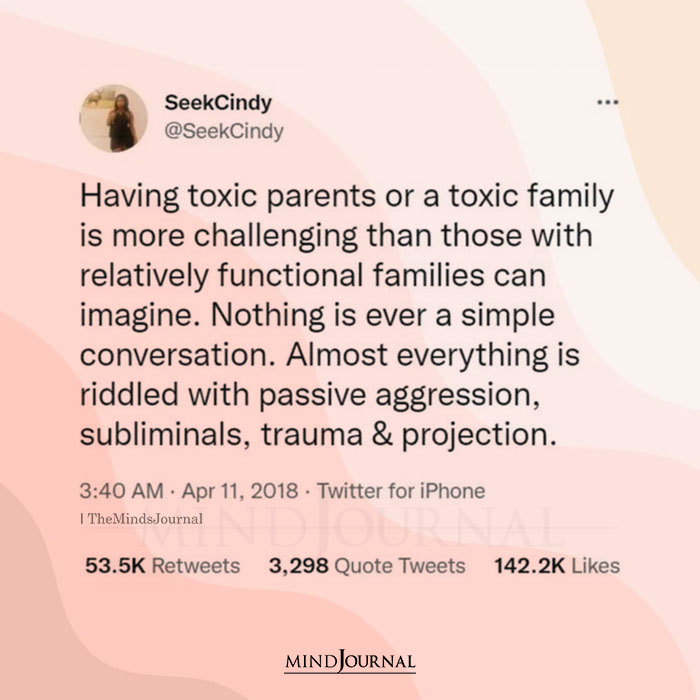
The following are examples of unhealthy patterns you may experience in adulthood, along with possible connections to your childhood.
As an adult do you sometimes . . .
Traits of A Child Raised By A Narcissist
1. Find it difficult to let go, laugh, or be spontaneous?
Possible connection: Your parent’s controlling, self-absorbed, or unpredictable behavior kept you on high alert for self-protection.
2. Feel undeserving?
Possible connection: Your parent treated you as a second-class citizen or made you feel small.
Related: 13 Signs Of A Toxic Parent
3. Get uncomfortable when good things happen?
Possible connection: Your parent spoiled good moments with selfish behavior, or gave you attention or gifts with strings attached.
4. Initially idealize people you meet, then inevitably feel let down by them?
Possible connection: Your parent acted magnanimously to outsiders but ignored your needs.
5. Feel anxious about confrontations with others?
Possible connection: Your parent prohibited dissent or punished you for speaking up.
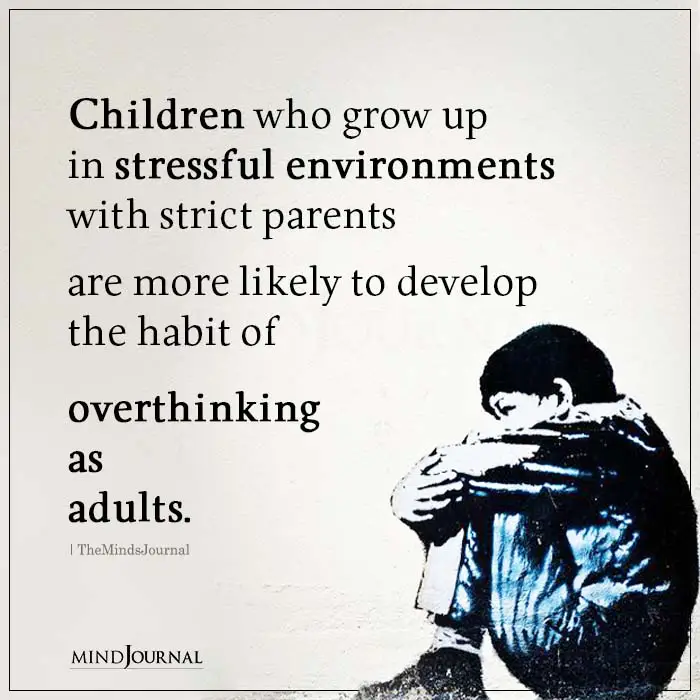
6. Struggle to feel close to others even when you want to?
Possible connection: Your parent regularly withdrew or rejected you for no apparent reason.
7. Please others at your own expense?
Possible connection: Your parent forced you to put their needs first, or made you feel guilty for having needs of your own.
8. Feel drawn to turmoil rather than harmony in your relationships?
Possible connection: Your family was a model of drama, scapegoating, and disharmony.
9. Judge yourself harshly?
Possible connection: Your parent was often critical or dissatisfied with you.
10. Self-soothe through excessive drink, food, shopping, or other compulsive behaviors?
Possible connection: Your parent’s behavior left you feeling unloved, trapped, alone, or hopeless.
11. Trust others unwisely or, conversely, find it hard to trust even when you want to?
Possible connection: Your parent convinced you to trust them, then betrayed you.
Related: 30 Ways In Which Narcissistic Parenting Affects A Child
12. Believe that dysfunction in relationships is normal or unavoidable?
Possible connection: Your parent lied, stonewalled, held grudges, or never took responsibility for their actions.
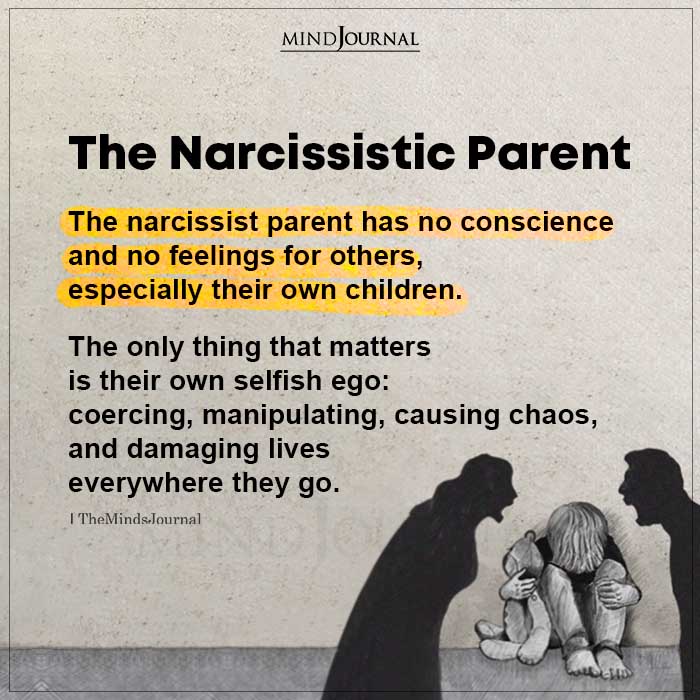
13. Feel numb or struggle to identify your feelings?
Possible connection: Your parent minimized or ridiculed your emotions, or attacked you for having emotions they didn’t like.
14. View other people as fragile, or view yourself as too much to handle?
Possible connection: Your parent acted like a martyr, or became unhinged by your healthy independence.
15. Feel extra-sensitive around entitled, arrogant, or manipulative people?
Possible connection: Your parent’s desperate need for attention took up the emotional oxygen in your family.
Human behavior is complex, and it would be a simplification to say that just because your parent did A, you will automatically do B. But years of being on the receiving end of narcissistic parenting can take a toll.
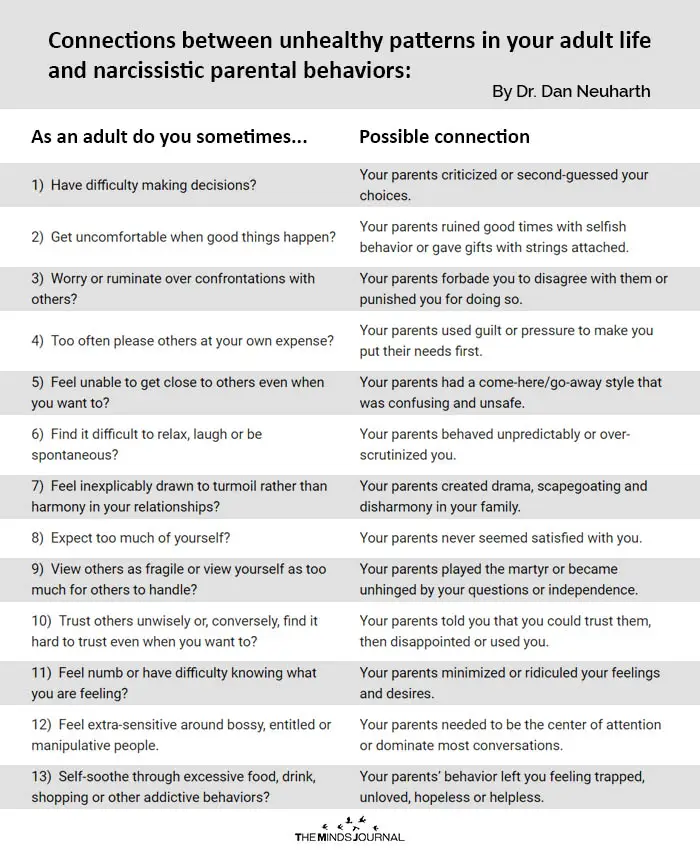
How to recover from growing up with a narcissistic parent?
As children, acknowledging family dysfunction when we have little power to do anything about it can feel devastating. As a result, we may ignore unhealthy patterns, believe what we see to be normal, blame ourselves, or seek means of escape.
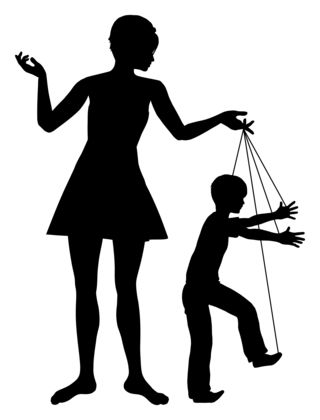
Such coping strategies may help us emotionally survive a difficult childhood—and it is important to honor whatever helped us survive in childhood—but those same coping strategies may later manifest in self-defeating ways like some of the 15 patterns listed above.
As an adult, making connections such as these may bring up emotions such as anger, sadness or dismay. But if you had a difficult upbringing, it does not mean you are irreparably damaged or that your life will always be difficult. None of the 13 patterns are life sentences. Everybody has challenges in life; some of the above tendencies maybe your challenges.
Related: Self-Identifying as an Adult Child of Narcissistic Parents
However, a difficult upbringing does not mean you are irreparably damaged or that your life will always be difficult.
If you notice yourself falling into one or more of the patterns listed above, the following steps may help:
- Recognize that the past has come alive in the present. Troubling feelings or counterproductive behaviors such as the 15 listed above can serve as a signal that your parents’ narcissism from decades ago is trying to reach into your present life. Your parents might like their legacy to continue forever. Don’t let it.
- Place responsibility and accountability correctly. Narcissistic parents may have blamed you for their problems and taken advantage of you for their own gratification. But let’s be honest: Your parents were adults and they were accountable for their actions, no matter how much they may have avoided taking responsibility. At the same time, you’re the adult now, and you are accountable for what you do with your life.
- Seek support. There are countless resources to help you move on. Psychotherapy excels at identifying and breaking unhealthy connections with the past. Support groups and 12-step programs provide a community of support and offer opportunities to see how others handle similar situations. Self-help books allow you to explore deep issues at your own pace.
- Ask yourself empowering questions such as:
“What is the best way to take care of me in this situation?”
“Is this how I want to treat myself or view others?”
“Who do I want to be, and what do I want to stand for, right now?”
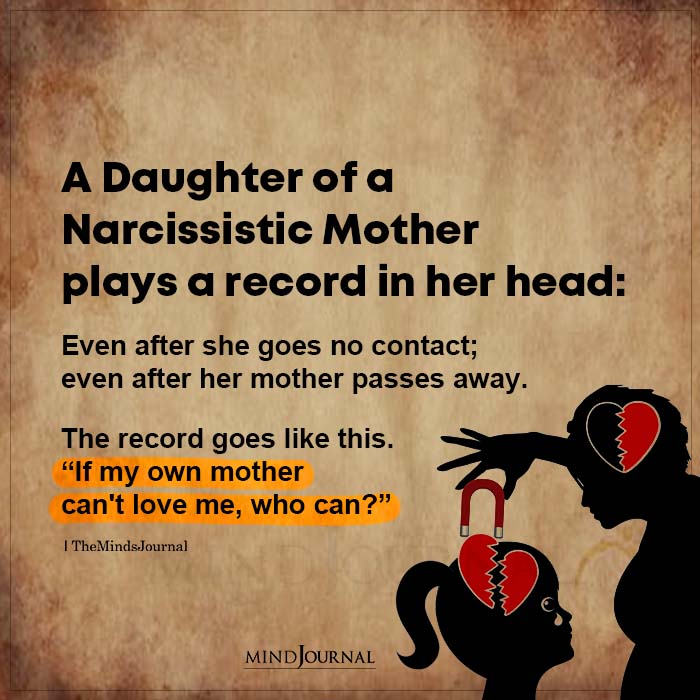
If all else fails and you are unsure of what to do in any given situation, simply ask yourself what your parents might do in the same situation, or may have told you to do.
Related: Narcissistic Fathers: The Dark Shadow They Cast From Childhood To Adulthood
Then do the opposite. Chances are you won’t go wrong by doing the opposite of a narcissistic parent’s self-serving advice or put-downs.
© Copyright 2017 Dan Neuharth, Ph.D., MFT
If you are someone who has been raised by a narcissist, then there is a lot you have gone through since a young age. But, there is always light at the end of the tunnel. Never let that criticism define you because none of it is true. Love yourself enough to believe that you are more than the negative things thrown at you.
If you want to know more about being raised by a narcissist, and how you can move on from it, then check out this video below:
By Dan Neuharth Ph.D. MFT Originally appeared on blogs.psychcentral.com Printed with permission from the author
Frequently Asked Questions (FAQs)
What causes a parent to be narcissistic?
Even though the cause behind narcissistic personality disorder is not yet known, experts suggest that neurobiology, genetics, and emotionally neglectful and overprotective parents can be the potential causes.
How do you protect yourself from a narcissistic parent?
Some of the best things you can do to protect yourself from a narcissistic parent are setting boundaries, staying calm and composed, minimizing contact, having an exit strategy in case conversations start to go south, and practicing self-compassion.
How do you survive being raised by a narcissistic mother?
If you were raised by a narcissistic mother, then you need to look out for yourself and try your best to move on from that trauma. Educate yourself, set boundaries, stand up for yourself and grieve for the love you never got.
What disorders do children of narcissistic parents have?
Some of the disorders that children of narcissistic parents suffer from are Borderline Personality Disorder, Narcissistic Personality Disorder, and Schizoid Personality Disorder. Anxiety and depression are quite common too.
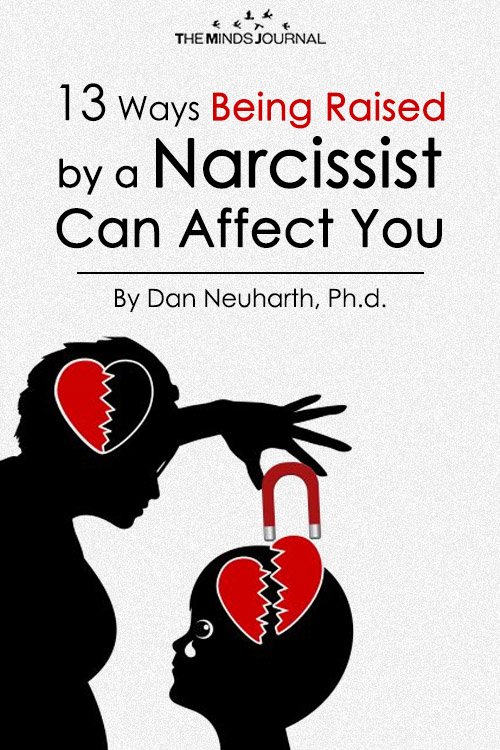

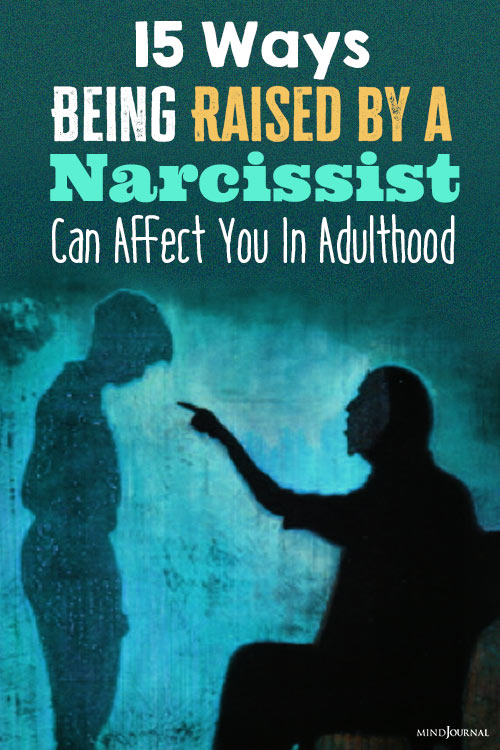
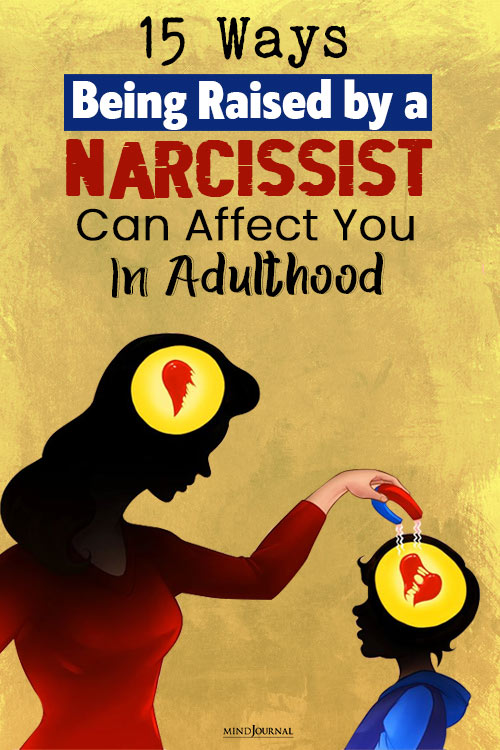










Responses
All the problems we have are related to each other. So the essence of all problems is selfishness. That it can destroy us, our children, all of humanity. Well, selfishness is the basis of vanity, hatred, struggle, competition. Conflict, racism, violence, war.
So, knowing how the ego operates, the ‘I’, the egoism – which is as much as saying the division, the internal fragmentation. It is when we can go beyond problems: vanity, indifference, insensitivity, cruel racism and their hatred of the different.